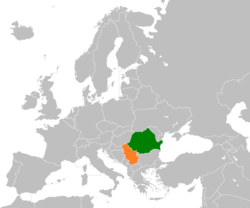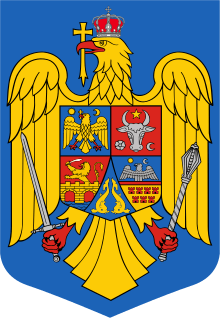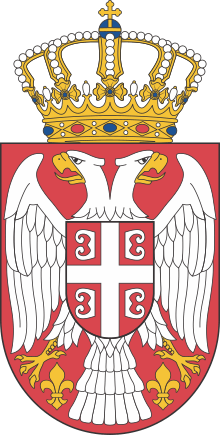Romania–Serbia relations
Romanian–Serbian relations are foreign relations between Romania and Serbia. Both countries established diplomatic relations on April 19, 1841.
 | |
Romania |
Serbia |
|---|---|
History
Although Serbia unofficially opened a kind of diplomatic agency in Bucharest in March 1836,[1] officially, the first Serbian diplomatic agency in Bucharest was established in February 1863, with Kosta Magazinović, as its first diplomatic agent. Reciprocally the first Romanian diplomatic agency in Belgrade was established on 12/24 March 1863 and the first diplomatic agent was Teodor Calimachi.[2]
In 1879, as a consequence of the independent state status, the diplomatic agencies from Belgrade and Bucharest became legations and the diplomatic agents, resident ministers. Thus on 14/26 April 1879 the Romanian diplomatic agency in Belgrade became legation, having Lascăr Catargiu as its first resident minister.[3] In the summer of 1879 Milan A. Petronijević became Serbia's first resident minister in Romania.[4] Later, after Romania and Serbia became kingdoms, in 1881 and 1882, their diplomatic representatives became "extraordinary envoy and plenipotentiary ministers". It was only in 1939 when the legations from Belgrade and Bucharest became embassies.
However, a gradual cut-off of international relations between Romania and Serbia (in that time Yugoslavia) happened in May 1941, after Romania recognized the independence of the German-controlled Independent State of Croatia, due to Romania still being in the Axis in that time.
Embassies
Romania has an embassy in Belgrade and a consulate-general in Vršac. Serbia has an embassy in Bucharest and a consulate-general in Timișoara.
Common memberships
Both countries are full members of the South-East European Cooperation Process, of the Stability Pact for South Eastern Europe, of the Central European Initiative, of the Southeast European Cooperative Initiative and of the Organization of the Black Sea Economic Cooperation. Also Romania is a EU member and Serbia is a EU candidate. Both countries are strongly against 2008 Kosovo declaration of independence. Romania has strongly supported Serbia's territorial integrity.
Serbs of Romania
The Serbs of Romania are a recognized ethnic minority. According to the 2011 census, there were 18,076 Serbs in Romania (~0.1%). Serbs mostly live in western Romania, in the Romanian part of the Banat region, where they constitute an absolute majority in two communes and a relative majority in one other.
Romanians of Serbia
The Romanians of Serbia are a recognized ethnic minority. According to the 2011 census, there were 29,332 Romanians in Serbia (~0.4%), while 35,330 people declared themselves Vlachs. There are differing views among some of the Vlachs over they should be regarded as Romanians or as members of a distinctive nationality. Romanians and Vlachs of Serbia mostly live in northeastern Serbia in Timočka Krajina, in the Serbian part of the Banat region, where they constitute a minority in two municipalities and in Voivodina region. Vlachs of Timok region have no schools in maternal language.
References
- Reprezentanțele diplomatice ale României, vol. I, 1859–1917, București, 1967, pp. 130–134.
- G.G. Florescu, "Agențiile diplomatice de la București și Belgrad (1863–1866)", în Romanoslavica XI/1965, pp. 126–131.
- A. A. Căpușan, Diplomați români de elită, vol. II, ediția a II-a, București, 2009, p. 13.
- Bogdan Catana, Relații diplomatice româno-sârbe, 1880–1913, Craiova, 2009, p. 74.
Further reading
- Sorescu-Marinković, A. (2010). "Serbian language acquisition in communist Romania" (PDF). Balcanica. 41: 7–31.

